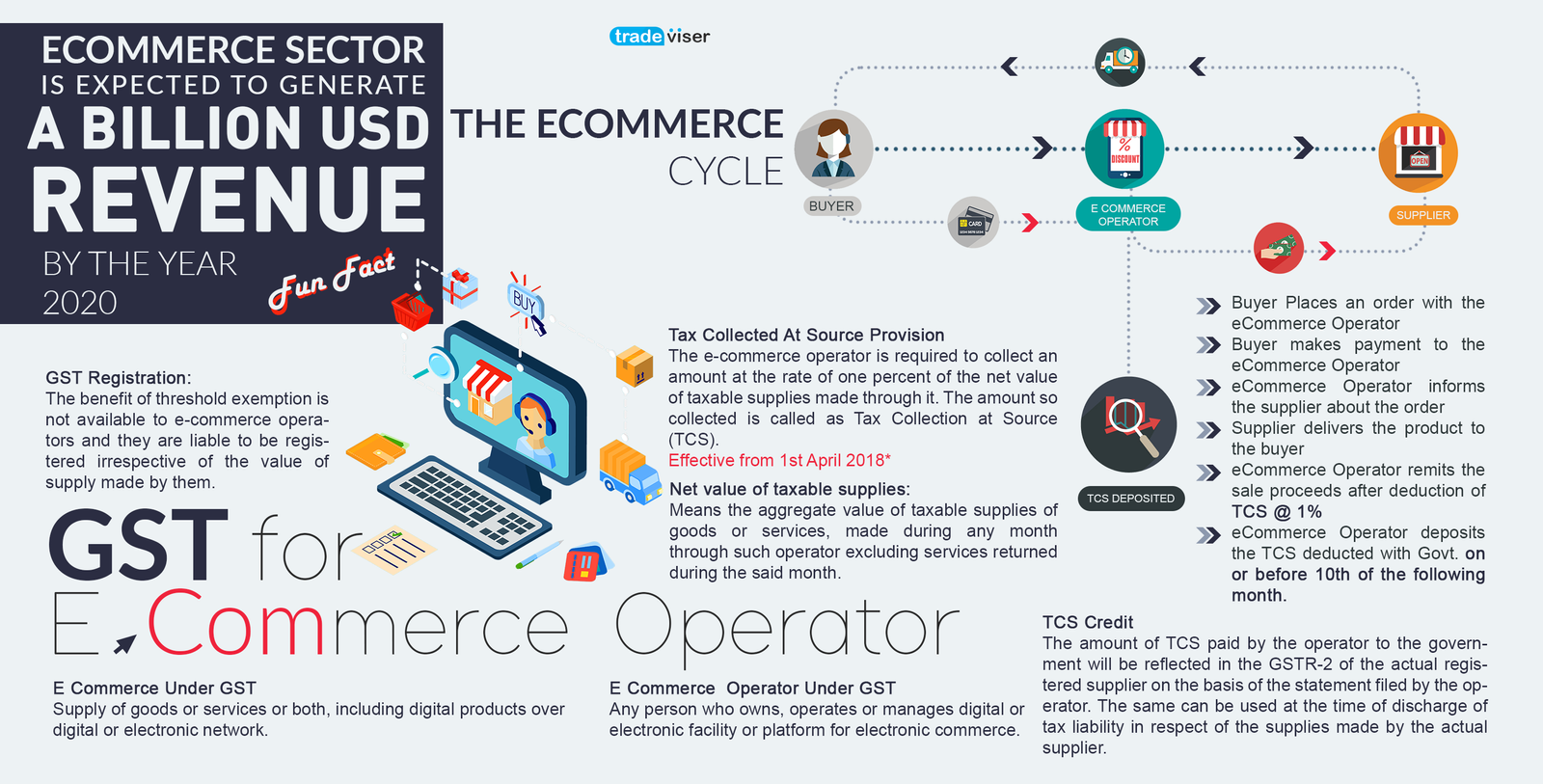E Commerce:
What Is E Commerce?
E Commerce has been defined in Sec. 2(44) of the CGST Act, 2017 to mean the supply of goods or services or both, including digital products over digital or electronic network.
Who Is E Commerce Operator?
E Commerce Operator has been defined in Sec. 2(45) of the CGST Act, 2017 to mean any person who owns, operates or manages digital or electronic facility or platform for electronic commerce.
Is it mandatory for E Commerce operator to obtain registration?
Yes, As per Section 24(x) of the CGST Act, 2017
Whether a person supplying goods or services through E Commerce operator would be entitled to threshold exemption?
No. Section 24(ix) of the CGST Act, 2017 lays down that the threshold exemption is not available to such persons and they would be liable to be registered irrespective of the value of supply made by them. This requirement is, however, applicable only if the supply is made through such electronic commerce operator who is required to collect tax at source under section 52 of the CGST Act, 2017.However, where the e-commerce operators are liable to pay tax on behalf of the suppliers under a notification issued under section 9 (5) of the CGST Act, 2017, the suppliers of such services are entitled for threshold exemption.
Will an e-commerce operator be liable to pay tax in respect of the supply of goods or services made through it, instead of an actual supplier?
Yes, but only in case of services notified under Sec. 9(5) of the CGST Act, 2017. In such cases tax shall be paid by the electronic commerce operator if such services are supplied through it and all the provisions of the Act shall apply to such electronic commerce operator as if he is the supplier liable to pay tax in relation to the supply of such services.
Will threshold exemption be available to electronic commerce operators liable to pay tax on notified services?
No. Threshold exemption is not available to e-commerce operators who are required to pay tax on notified services supplied through them.
What is Tax Collection at Source (TCS)?
The e-commerce operator is required to collect an amount at the rate of one percent (0.5% CGST + 0.5% SGST) of the net value of taxable supplies made through it, where the consideration with respect to such supplies is to be collected by such operator. The amount so collected is called as Tax Collection at Source (TCS).
An e-commerce company is required to collect tax only on the net value of taxable supplies.
What is meant by “net value of taxable supplies”?
The “net value of taxable supplies” means the aggregate value of taxable supplies of goods or services or both, other than the services on which entire tax is payable by the e-commerce operator, made during any month by all registered persons through such operator reduced by the aggregate value of taxable supplies returned to the suppliers during the said month.
Is every e-commerce operator required to collect tax on behalf of actual supplier?
Yes, every e-commerce operator (other than an operator required to pay tax under section 9(5) of the CGST Act, 2017) is required to collect tax where consideration with respect to a taxable supply is collected by such e-commerce operator.
What time should the e-commerce operator make such collection?
The e-commerce operator should make the collection during the month in which the consideration amount is collected from the recipient.
What is the time within which such TCS is to be remitted by the e-commerce operator to Government?
The amount collected by the operator is to be paid to the government within 10 days after the end of the month in which amount was so collected.
How can actual suppliers claim credit of this TCS?
The amount of TCS paid by the operator to the government will be reflected in the GSTR-2 of the actual registered supplier (on whose account such collection has been made) on the basis of the statement filed by the operator. The same can be used at the time of discharge of tax liability in respect of the supplies made by the actual supplier.
Tradeviser, an idea shaped into reality with the motive of helping new businesses and startups with professional guidance end-to-end business services. Ever since its inception since 2016, Team Tradeviser has worked diligently with over 200 startups and been part of their of their sedulous journey to make it to the big picture.

